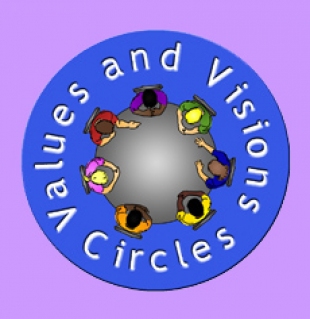Spiritual Practices in Your Circle
A Values & Visions Circle offers many opportunities for spiritual practices. Here are three to start with:
1. Hospitality. You have not come together to judge but to welcome. This applies to the stories you consider as well as the other people in the circle. Often our approach to cultural stories is suspicious. Does this film have a hidden agenda? Is this novel truly valuable or is it just entertaining? When you work with a variety of resources — from obvious choices to unlikely ones — you practice openness and receptivity. Show hospitality to strange stories and you will often find yourself entertaining angels.
2. Attention. Watching, reading, listening — these are all aspects of paying attention, one of the most important spiritual practices. Stories require you to be truly present with them to find their meanings. Your conversation about them reinforces this practice by requiring you to be mindful of others and your own reactions.
3. Connections. Spirituality, it has been said, is the art of making connections. This is also true of conversation. In a Values & Visions Circle, you are asked to make connections within a story, between the story and your life, and among your story and the stories of others in your circle.
A 4-Step Soulmaking Process
For those of you who like to see a process behind the free flow of conversation, here is a good one for soulmaking.
Step One: Focus on the story (film, book, audio). Share your experience of it by expressing your feelings and ideas about its meaning. (No Cross-talk Sharing)
Step Two: Go deeper into the story. Examine themes of the story and how they are developed. (Conversation, perhaps in pairs or small groups within the circle)
Step Three: Relate the theme to the stories of your lives. Share personal experiences. (Conversation, perhaps in pairs or small groups from the circle)
Step Four: Share and engage all the stories to see what meanings arise. (Conversation with full circle)
Guidelines for Circle Conversations
1. Maintain confidentiality. What is said in the circle stays in the circle.
2. Be an active participant. Come prepared to share, even when you don't feel like it.
3. Respect each other's need to be quiet occasionally. Everyone has a right to "pass" even during periods of no cross-talk sharing.
4. Speak from the heart. Freely reveal your feelings and beliefs.
5. Listen from the heart. Give the speaker your full attention. Do not try to listen and think about what you will say next at the same time.
6. As much as possible, be concrete rather than abstract. Tell a personal story. Illustrate your points. Make connections between the subject of your conversation and the experiences of your daily life.
7. Don't interrupt or dominate. Don't try to be an expert.
8. Speak only for yourself. Don't try to clarify someone else's point.
9. Do not offer unsolicited advice. Do not counsel or analyze someone.
10. Be there with empathy when it is needed and support when it is requested.
On Conversation
Values & Visions Circles are encouraged to engage in conversation. This is not the same thing as talk, according to archetypal psychologist James Hillman:
"Not just any talk is conversation, not any talk raises consciousness. A subject can be talked to death, a person talked to sleep. Good conversation has an edge: it opens your eyes to something, quickens your ears. And good conversation reverberates: it keeps on talking in your mind later in the day; the next day, you find yourself still conversing with what was said. That reverberation afterwards is the very raising of your consciousness: your mind's been moved. You are at another level with your reflections."
May the conversations in your Values & Visions Circle be characterized by compassionate and loving listening. May your conversations open your eyes and create reverberations that linger with you long after you have left the circle for the day. And may you experience interesting and welcome turnarounds of your soul through your experiences together.
